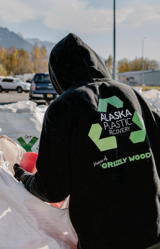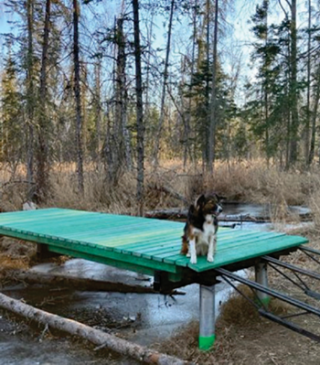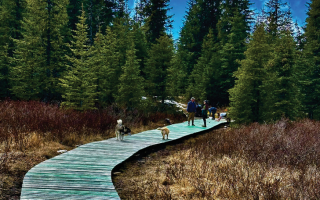Plastic Oilfield Scrap to Picnic Tables: How EPA-Supported Technology is Advancing Circular Economy Solutions in Alaska
Circular economies reduce material use, recapture "waste" as a resource, and redesign materials to be less resource-intensive, keeping them in circulation as long as possible. By prioritizing circularity, materials' negative life cycle impacts and resource depletion are minimized. Kamilo and PKS Consulting, two EPA Small Business Innovation Research (SBIR) awardees, are demonstrating the power of collaboration to achieve these goals.
SBIR is a federal congressionally mandated research program that invests in American small businesses. Since 1982, EPA's SBIR program has supported small businesses with over 1700 awards to develop environmental technologies aligned with EPA's priorities. These awards stimulate economic development and job growth, and result in tangible improvements to the environment through the development of new products, patents, approaches and technologies.
TRANSFORMING PLASTIC WASTE INTO DURABLE LUMBER

Alaska Plastic Recovery (APR), a wholly owned subsidiary of PKS Consulting, manufactures Grizzly Wood, a high-performance recycled plastic lumber product. The process begins with the recovery of discarded oilfield thread protectors, which have historically been sent to landfills, along with residential post-consumer plastic and plastic ocean waste. A composite of these materials is processed and molded into lumber products used for trails, decking, and picnic tables.

Using plastic lumber for outdoor projects can offer several benefits, particularly in challenging environments like Alaska. Plastic lumber is highly resistant to moisture, rot, and insect damage, ensuring durability in Alaska's diverse climate conditions. Its low maintenance requirements also eliminate the need for regular painting or sealing, reducing long-term upkeep efforts. Additionally, Grizzly Wood, made entirely from recycled materials, contributes to environmental sustainability by diverting waste from landfills and reducing the demand for virgin timber.
ENABLING TRANSPARENCY AND OPERATIONAL EFFICIENCY WITH DIGITAL TRACKING

Kamilo, an Oakland, California-based green technology company, partnered with PKS on a new collaborative project. Kamilo complements PKS's work by providing a patented geospatial traceability platform that enables end-to-end tracking of recovered materials. This platform ensures transparency and accountability across the supply chain, providing measurable life cycle data that highlights the environmental benefits of using recycled materials.
In addition to supply chain tracking, Kamilo's geospatial traceablity technology enhances APR's operational efficiency. By maintaining real-time inventory updates, Kamilo helps APR streamline material management, optimize production schedules, and reduce costs associated with manual tracking. These efficiencies enable APR to scale its operations and meet growing demand for Grizzly Wood without compromising quality or sustainability.
A PARTNERSHIP DELIVERING TANGIBLE ENVIRONMENTAL IMPACTS
The collaboration between Kamilo and APR has delivered impressive metrics:
- 87,000 pounds of thread protectors and residential post-consumer and ocean plastic waste kept out of landfills, saving approximately 90 cubic yards of landfill space.
- 130 trees conserved by substituting wood with recycled plastic.
- 210 metric tons of CO2 equivalent avoided, combining emissions saved from making new products from recycling plastic waste in lieu of virgin plastic and from carbon storage saved through forest conservation.

In addition to these tangible environmental impacts, the project creates practical economic benefits for Alaskan communities. For example, Alaska Trails has adopted Grizzly Wood for sustainable pathway construction, ensuring infrastructure that aligns with the state’s commitment to providing its communities with accessible parks and trails. The durability and low-maintenance nature of Grizzly Wood mean that less time and money are required for upkeep and replacement of decked trail pathways. This allows the state and non- profits to allocate more resources toward expanding and enhancing outdoor recreational opportunities and maintaining the natural beauty that Alaska’s residents and visitors cherish.
DRIVING INNOVATION THROUGH EPA’ S SBIR PROGRAM
Both Kamilo and PKS credit EPA’s SBIR program for their technological advancements. The two companies applied for, and each received an EPA SBIR Phase I award ($100,000) for “proof-of-concept” for their innovative
technologies. Both companies went on to receive Phase II awards which allowed APR to refine their manufacturing process for Grizzly Wood, while Kamilo developed its geospatial traceability platform and Trustmark certification system. Together, these innovations advance the use of waste materials as a resource to support the circular economy while demonstrating the economic benefits of sustainable practices.
SCALING CIRCULARITY FOR BROADER IMPACT
The collaboration between Kamilo and PKS demonstrates the transformative potential of a circular economy. By addressing waste at its source and validating its re-entry into the market as high- quality products, these companies are creating scalable solutions that reduce environmental impacts and support economic growth.
Patrick Simpson, CEO of PKS Consulting, reflects on their progress:
“We’re proud that Grizzly Wood tells a story of sustainability, innovation, and community leadership. This collaboration shows how materials once seen as waste can drive meaningful change.”
Anna-Marie Cook, CEO of Kamilo, adds:

“Our mission is to prove that waste is a resource. By combining verified tracking with operational efficiencies, we’re helping our partners maximize their impact and empowering industries to take positive action for the planet.”
April Richards, EPA SBIR Program Manager, highlights the significance of this partnership:
“Seeing two EPA SBIR awardees working together to advance circular economy principles is inspiring. Collaborations like this showcase how innovative approaches to waste management can transform materials into valuable resources, creating environmental and economic benefits. EPA’s SBIR program is proud to support the development of technologies that make these kinds of solutions possible.”
Supported by EPA’s SBIR program, Kamilo and PKS are charting a path forward, inspiring industries and communities to embrace circular economy principles and unlock the untapped potential of waste materials.
EPA SBIR awards have been made in 49 U.S. states and leverage the power and innovation of American small businesses to support EPA’s Powering the Great American Comeback Initiative.
Learn More About the Science
